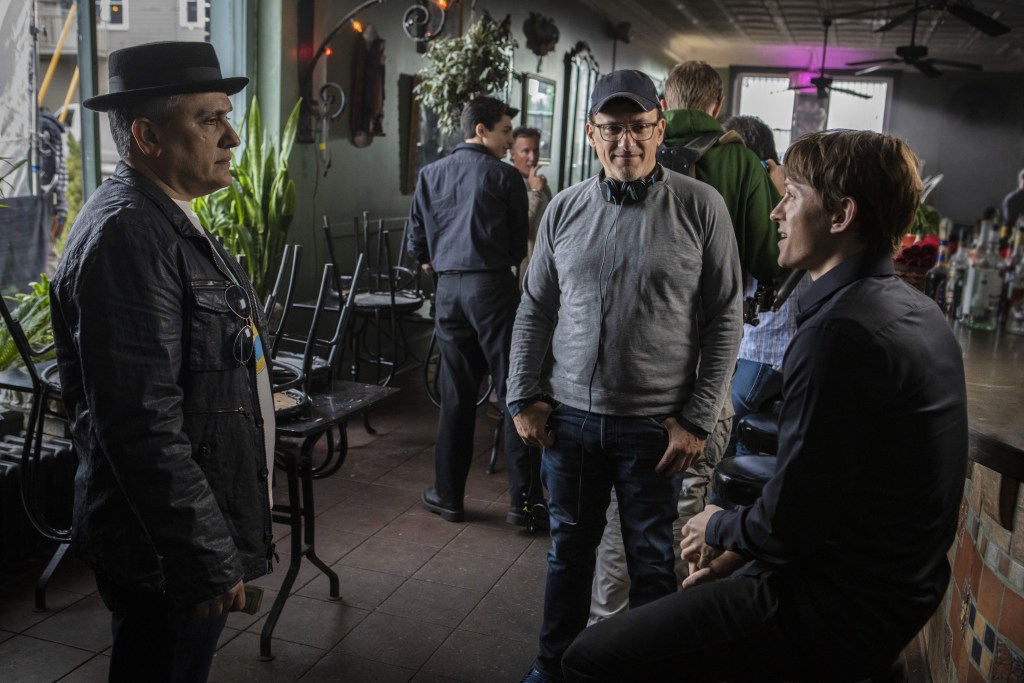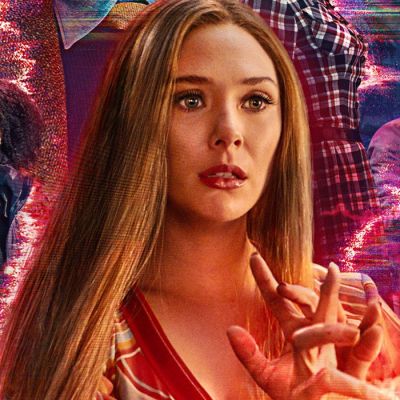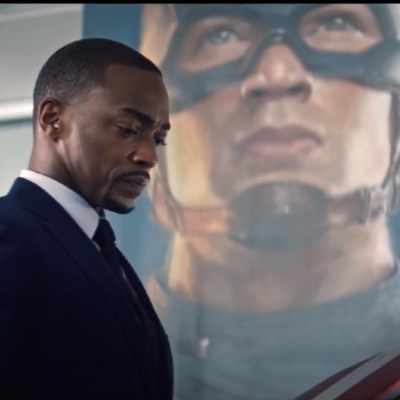Why Tom Holland Was Terrified of Playing a Bank Robber in Cherry
All of a sudden Tom Holland is everywhere. He’s got two movies out right now–the sci-fi thriller Chaos Walking and the drug/crime drama Cherry–and the latter is making its premiere on Apple TV+ this weekend after a limited run in theaters. He also recently wrapped production on the long-developing adaptation of the Uncharted video game franchise, and he’s currently working with director Jon Watts again on their third standalone Spider-Man adventure together, Spider-Man: No Way Home.
In Cherry, based on the best-selling semi-autobiographical novel by Nico Walker, Holland stars as the title character, a young Cleveland man who joins the Army after his girlfriend (Ciara Bravo) announces she is going away to college. He returns home from Iraq with PTSD, develops an opioid addiction, and eventually turns to bank robbery to support his habit.
The often harrowing film is directed by Anthony and Joe Russo, making it the first motion picture directed by the Cleveland-born brothers since 2019’s Avengers: Endgame. Cherry marks Holland’s fourth collaboration with the Russos, following Endgame, Captain America: Civil War (2016), and Avengers: Infinity War (2018), but his first time working with them without a superhero costume.
Cherry is also one of two recent movies, the other being last year’s grim The Devil All The Time, in which the British actor steps away from his generally sunny, innocent demeanor to take on a darker, more tormented character. We touched on that, working with the Russos, researching the world of addiction, and more–including little nuggets on No Way Home and Uncharted–when we hopped on Zoom recently with the young Mr. Holland.
Den of Geek: What did you respond to in the character of Cherry, as well as the script? What was your emotional and visceral response to his story?
Tom Holland: I think my initial response was that I was terrified of the idea of playing this character. It’s the type of role I’ve definitely never done before, and I was a little sort of apprehensive and questioned whether I could do it. Knowing that the Russo brothers were going to be there to support me through the job is what kind of tipped me over the edge into saying yes. But my initial response was, “I don’t think I’m the right person for this job because I don’t know if I can do that.”
You probably had a level of trust established with the Russos from working on the three Marvel pictures you did together. Did that make you feel comfortable right away?
Yeah. Absolutely. Still, I had that element of awe when it came to the Russos because they were the directors of the Avengers films, and I was still very much the new kid on the block when I was making those films. It was really nice for me to get to know them both on a more personal level and, obviously, that level of trust grew as the film progressed. It grew and it grew and it grew, and it’s now to the point where Joe and Anthony could ring me up, and I would be on set for them in a heartbeat. The trust between the three of us definitely grew.
How is their style of directing different on this? Was there more of a personal rapport because of the fact that they’re not dealing with the same kind of visual effects as in the Marvel movies or servicing 50 different characters?
I felt a little spoiled to be honest, because I was getting their utmost attention. But I mean, their direction style didn’t change in the way that they spoke to people, in the way that they addressed people, in the way that they treated people on set. But the style in which they would use the camera or the way they would get you to portray or work in a certain scene is very different because, obviously, it’s a very different type of film.
But from a logistical standpoint of how they made the film, they were basically the same two guys, just having fun. It’s nice to see two people who are so in love with cinema just having a good old play and figuring it out as they go along.
Was it interesting and maybe refreshing for you to do a film where you’re not in the Spider-Man suit for so much of the movie, and you’re not acting against a green screen?
Absolutely. Working on green screen and blue screens and wearing a spandex Spider-Man suit is amazing, and it’s awesome and I love it, but there’s something freeing about everything on set is what is in the shot, what is in the story. I don’t have to imagine anything, because everything is a tangible asset and is right there in front of me. It’s a different process, and I love both equally. But it was nice to kind of have a change of pace and dive into something a little bit smaller.
How was it working with Ciara on her first feature film? Was it easy to establish the rapport with her?
We were so lucky with Ciara. I remember when I watched her audition tape, when the boys had cast her, and they sent it to me just to say, “By the way, this is the girl who’s going to play Emily,” for the first time in my career, I was so intimidated. She just has this gravitas that she brought to the character in her take that was so amazing.
I was really excited to work with her and I was really happy when I found out that her and I were very similar and had a lot in common. We became very, very good friends, which was so valuable for us, because this film was such a difficult film to make, physically and emotionally. The fact that we got along so well meant that we could help each other through the process. She was like my emotional support person, and I was hers, and it was great. We were a little team.
Do you take a role like this, or something like The Devil All the Time, knowing that these are going to not just challenge you as an actor, but show a whole different side of you to an audience that maybe only knows you as Spider-Man?
I love playing Spider-Man, and I think it comes with its own set of challenges. I think sometimes people overlook that superhero films do require performance, a character arc, building up a backstory, an objective of where you want to go. It’s just these films are very different. They’re very different in style, but they’re not very different in the way that you make them. The process of making a film is pretty similar. They just spend less money, and it’s less blue screen. But, yeah. I enjoyed the sort of creative freedom of making a film a little bit darker.
Did you get to meet and talk with Nico Walker? I know you did meet with some people with addiction problems, as well as some veterans.
I’ve never actually met with Nico. We were supposed to meet a few weeks ago, but for some reason, our schedules kind of got a bit jumbled up, and we couldn’t get together. But I hope to meet him. He’s obviously the one person that I’m really nervous about watching the film, because we took a portion of his life, and we turned it into this piece of art, and I hope it’s something that he likes.
But we did loads of research when it came to speaking to veterans and people suffering from PTSD and substance abuse, and it was so valuable in the making of this film, because I couldn’t have made this an authentic experience for the audience without having that information from those people. I’m very grateful that the men and women I spoke to were very open to talk about the things that they’d been through, which were sometimes very harrowing.
What did you learn that maybe you hadn’t known before and were able to apply to the part?
Wow. I could go on and on. I think one of the biggest things for me that helped drive a lot of the motivation in the scene was that once you’re hooked on heroin, all you can think about is getting more heroin. It was a really good kind of catalyst to tell these stories authentically. I think that was one of the most valuable things I took away from my research.
What was the most physically challenging aspect of the shoot?
The most physically demanding portion of the film was dope life, when I was losing all the weight, and I was skinny, and I was having to starve myself. And robbing the banks was tiring, because I was so weak from being so skinny and frail, I guess. So that would easily be the more physically demanding aspect of the film.

You also play this character as he ages over 15 years. Is it fair to say this is the first time you’ve actually played a character who’s aged over that kind of span of time?
Absolutely. On The Lost City of Z, a James Gray film I did, there was quite a large progression in age, but I was no way the lead of that film. A lot of my stuff sort of happened off camera. Obviously in Cherry, you are with this character from the beginning to the end. That meant that I had to do a lot of the growing on screen, and it was difficult. It was tricky, because trying to play older, to me, felt very fake. That’s where I was so lucky to have my amazing makeup artist, Rachael Speke. She did a wonderful job of aging me up throughout the course of the film.
It was difficult, and I just had to trust the Russos and that they knew what they wanted and they were happy with what they were getting. But it wasn’t the easiest thing in the world to do.
Is that something that you would like to apply to other characters? As you continue to play Spider-Man, would you like to see him age a little more noticeably, if it’s appropriate?
Yeah. Peter Parker is a character that everyone knows and loves. It would be really interesting to sort of find a side to him that people haven’t seen before. Whether or not we do that, I don’t know.
What can you say about Spider-Man: No Way Home in terms of how it expands the MCU and how it evolves Peter’s character?
Well, there’s not really much I can say, obviously. What I can say is that I’m having the time of my life making it. It’s so fun being back with Jacob [Batalon] and Zendaya, and [director] Jon Watts. The film is incredibly ambitious, and I’m delighted to say that we’re succeeding in making it. It’s going really well. We watched a fight scene that we had shot a few weeks ago, and I’ve never seen a fight scene quite like it in the MCU. I’m really excited for audiences to see that.
You also just recently wrapped Uncharted. What do you think people will see in that if they’re not fans of the video game?
Well, an interesting idea and one that I really think lends itself to our film, is that when you watch a video game film–if you’re a fan of the games–I often wonder, “Why would you watch the film?” Because it’s less immersive. You can go and be that character. Why would I just want to watch that character?
But what we’ve got is we’re telling the prequel story of how the character, Nathan Drake, became this worldwide known character. For the fans that love the games, they’re getting an aspect of the story that they’ve never seen before. And the people that haven’t played the games are getting a really nice introduction to a character. It kind of works for everyone.
It’s a really fun film, and the action is amazing, easily some of the coolest action I’ve done so far. I had a lovely chat with Tom Rothman, the chairman of Sony, he saw the film, and he’s over the moon with it. If the boss man is happy, then everyone is happy. We’re really good.
Cherry premieres on Apple TV+ on Friday, March 12.
The post Why Tom Holland Was Terrified of Playing a Bank Robber in Cherry appeared first on Den of Geek.
From https://www.denofgeek.com/movies/tom-holland-terrified-playing-bank-robber-cherry/



